Back-up batteries are used as a power source for DC power supply and UPS (uninterruptible power supply) systems during emergencies. They are also used to drive power generators.
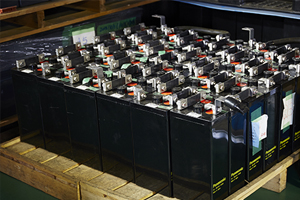
■ Liquid Batteries
・deformation of electrode
・expansion or deformation of battery
・cracks on battery surface
■ Sealed Batteries
・expansion or deformation of battery
・cracks on battery surface
*Even if the above features are not apparent, battery degradation may still have occurred, as the majority of cases cannot be detected without thorough inspection.
・ Power is not supplied during emergencies
・ Steady power and sufficient operating time cannot be maintained as a result of degradation
・ Losses sustained to company and customers as a result of failed equipment using back-up power
If back-up batteries are continuously used without being replaced, the outer covering may break apart. This releases odors and smoke or may cause the battery to ignite, leading to fires and other serious accidents. Among explosions alone, 74% result from a lack of maintenance.
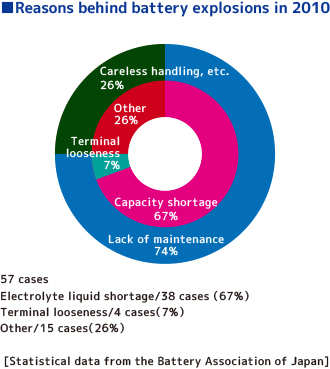
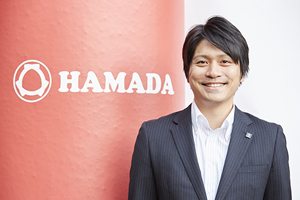
Our salesperson in charge of battery regeneration: Toshihide Ueda
HAMADA's battery regeneration operations are available nationwide in every region of Japan.
We also provide free quotation services, if your company is interested in cutting costs or reducing its environmental load.
Please feel free to call us.
Regenerated batteries can save you more that 50% of the price of new batteries!
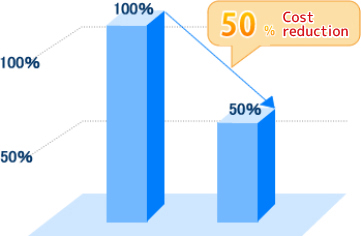

We purchase scrap batteries brought to us by our customers or collected by our company delivery service. A quotation will be provided based on the metal's market price, type, and quantity before we make our purchase. Please contact us anytime for a free consultation.
By using LCA, we were able to quantify the amount CO2 emissions decreased with regenerated batteries. The results show that reusing batteries is actually better for the environment than recycling. As reuse is promoted, it will help form the base of a recycling-oriented society.
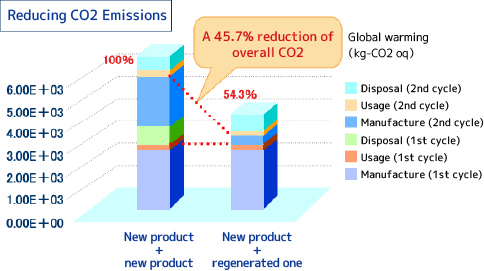
After installing your newly-purchased batteries, HAMADA offers to collect the scrap ones free-of-charge.
There are two types of battery degradation, chemical and physical.
Only batteries with chemical degradation can be regenerated. Chemical degradation refers to the crystalized lead sulfate (sulfation) that attaches to the electrode from repeated charging and discharging.
Physical degradation is actual damage to the battery's casing, etc.
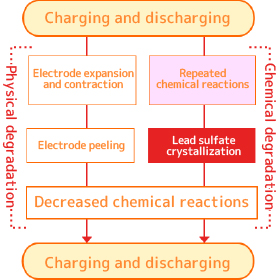
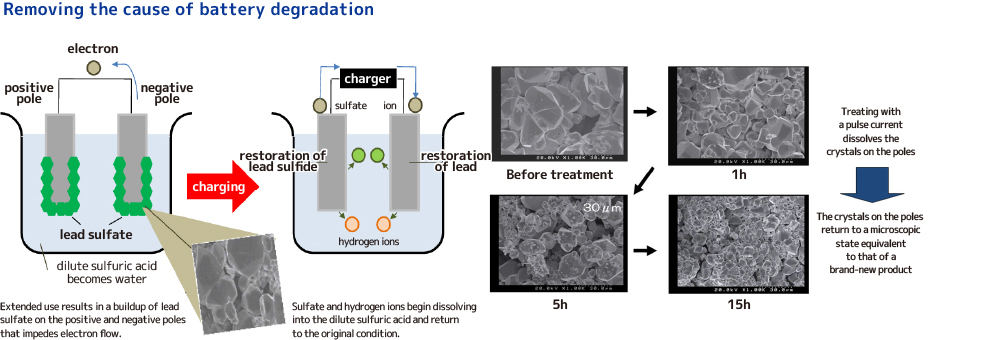
For used batteries transported to our factory, we first inspect the exterior, inner resistance, and voltage. If the reason for deterioration is chemical degradation, it is possible to regenerate the batteries, and we begin regeneration procedures accordingly. Hamada's original technology for battery regeneration uses high-frequency pulse currents to remove crystalized lead sulfate from the electrode surface, which is one of the main sources of battery deterioration. As a result, after regeneration it is possible to restore capacity to that of a brand-new battery.
However, if the reason for degradation is physical deterioration (cracks, etc.), regeneration will not be possible. In turn, the battery will be transported to a lead refining company to be recycled as raw materials.

After regeneration, batteries are checked through a 10-hour discharge test to verify capacity and confirm that they meet the same JIS standards as new batteries (JIXC8704-1, JISC8704-2). HAMADA Company takes pride in the reliability and the quality of its regenerated batteries as well as its other rich products an services. Earning your trust by providing high quality products and services is more than an objective, it is our mission.
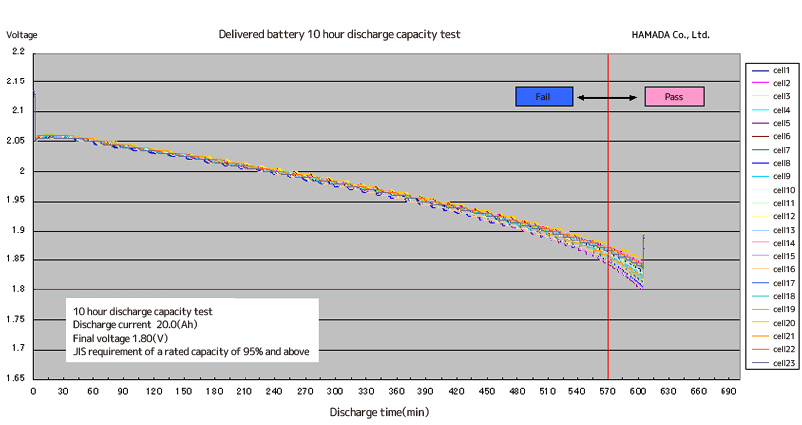
HAMADA gaurantees the reliable operation of its regenerated batteries from the day they are delivered throughout the contracted period. Through regular annual checks, data is compiled for each battery individually and the results are provided to our customers. If any decline in performance is detected during the contracted period, our technicians will immediately replace the faulty device. The warranty included in the contract usually is for 7 years, but it can be changed according to the clients' situation or demands.

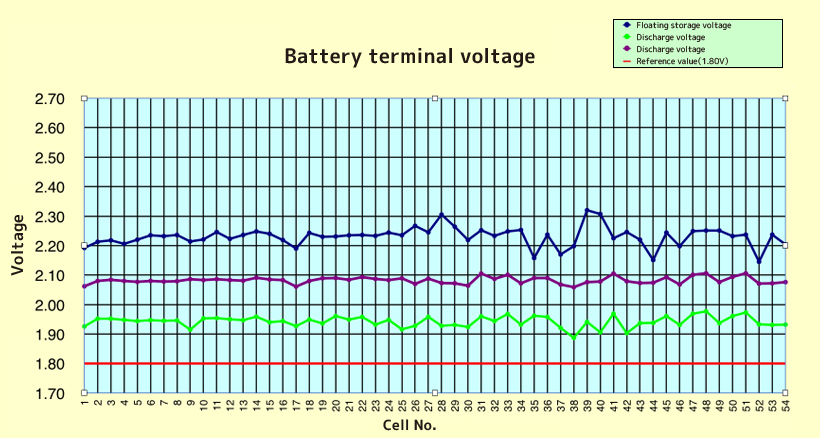
Short-term discharge test to check charging capacity
Battery terminal voltage/Inner resistance/Battery discharge performance
What are physically deteriorated batteries?
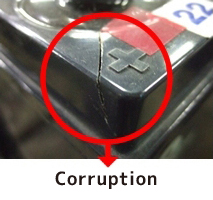
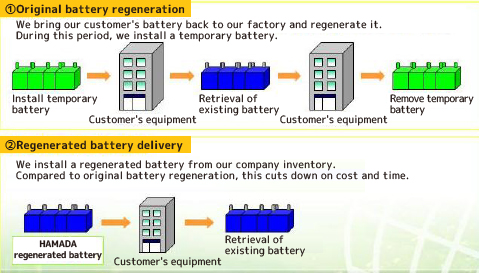
We always keep a large number of battery types and capacities in stock. By utilizing our stock of batteries, you can replace your battery in a single go without the need to intall both a temporary battery and its charged replacement.
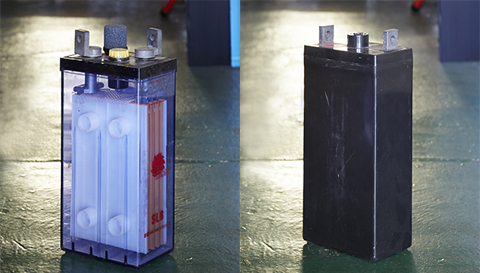
At HAMADA, we handle various kinds of batteries, making it possible to exchange your liquid-type battery for a sealed type. By introducing sealed batteries, you will be able to free yourself from the troublesome maintenance that accompanies liquid-type batteries. Our equipment management is widely praised by our clients.
A look at HAMADA's achievements
| Industry | Battery type | Number of cells | Application |
|---|---|---|---|
| Logistics | MSE-200 | 54 | Emergency |
| Chemical | SNS-200 | 12 | Emergency |
| Government | MSE-300 | 106 | Emergency |
| Manufacturing | MSE-500 | 300 | Solar power generation and storage |
| Hospitals | MSE-500 | 54 | Emergency |
| Commercial facilities | MSE-300 | 54 | Emergency |
| Hotels | MSE-500 | 54 | Emergency |
| Supermarkets | MSE-500 | 54 | Emergency |
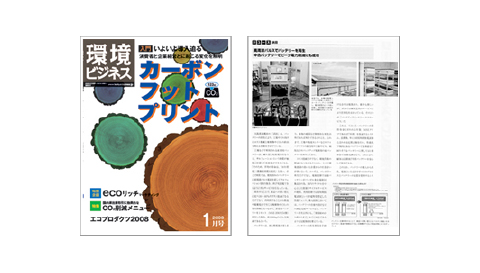
HAMADA was mentioned in the January special edition of the magazine Environmental Business on the topic of “Reducing initial costs through lease, reuse and rental-A menu to reduce CO2 emissions for domestic emissions trading”. Here, an article was published introducing our high-frequency pulse battery regeneration and success with reducing peak power for used batteries.

Working Towards a Recycling-Oriented Society that Effectively Uses the World's Limited Resources

From Buildings to the Removal of Mechanical Equipment

Separation and Disposal of Industrial Waste Zero-Emission Recycling

Lower Costs, Reduced Environmental Burden, and Business Continuity Planning

Always Looking for New Challenges
Feel free to contact us or request materials